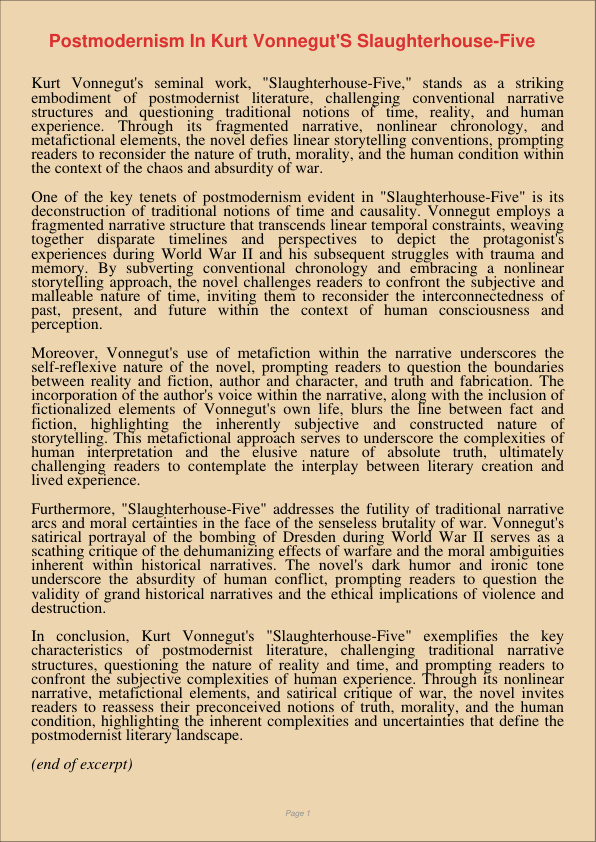
Kurt Vonnegut’s seminal work, “Slaughterhouse-Five,” stands as a striking embodiment of postmodernist literature, challenging conventional narrative structures and questioning traditional notions of time, reality, and human experience. Through its fragmented narrative, nonlinear chronology, and metafictional elements, the novel defies linear storytelling conventions, prompting readers to reconsider the nature of truth, morality, and the human condition within the context of the chaos and absurdity of war.
One of the key tenets of postmodernism evident in “Slaughterhouse-Five” is its deconstruction of traditional notions of time and causality. Vonnegut employs a fragmented narrative structure that transcends linear temporal constraints, weaving together disparate timelines and perspectives to depict the protagonist’s experiences during World War II and his subsequent struggles with trauma and memory. By subverting conventional chronology and embracing a nonlinear storytelling approach, the novel challenges readers to confront the subjective and malleable nature of time, inviting them to reconsider the interconnectedness of past, present, and future within the context of human consciousness and perception.
Moreover, Vonnegut’s use of metafiction within the narrative underscores the self-reflexive nature of the novel, prompting readers to question the boundaries between reality and fiction, author and character, and truth and fabrication. The incorporation of the author’s voice within the narrative, along with the inclusion of fictionalized elements of Vonnegut’s own life, blurs the line between fact and fiction, highlighting the inherently subjective and constructed nature of storytelling. This metafictional approach serves to underscore the complexities of human interpretation and the elusive nature of absolute truth, ultimately challenging readers to contemplate the interplay between literary creation and lived experience.
Furthermore, “Slaughterhouse-Five” addresses the futility of traditional narrative arcs and moral certainties in the face of the senseless brutality of war. Vonnegut’s satirical portrayal of the bombing of Dresden during World War II serves as a scathing critique of the dehumanizing effects of warfare and the moral ambiguities inherent within historical narratives. The novel’s dark humor and ironic tone underscore the absurdity of human conflict, prompting readers to question the validity of grand historical narratives and the ethical implications of violence and destruction.
In conclusion, Kurt Vonnegut’s “Slaughterhouse-Five” exemplifies the key characteristics of postmodernist literature, challenging traditional narrative structures, questioning the nature of reality and time, and prompting readers to confront the subjective complexities of human experience. Through its nonlinear narrative, metafictional elements, and satirical critique of war, the novel invites readers to reassess their preconceived notions of truth, morality, and the human condition, highlighting the inherent complexities and uncertainties that define the postmodernist literary landscape.
「真诚赞赏,手留余香」
真诚赞赏,手留余香
使用微信扫描二维码完成支付
